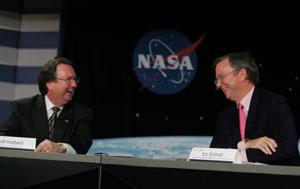 Google is building a research complex at NASA/Ames Research Center and the two will collaborate in several areas. Here’s our Merc story (free registration) about the accord.
Google is building a research complex at NASA/Ames Research Center and the two will collaborate in several areas. Here’s our Merc story (free registration) about the accord.
Relevant tidbits follow. Keep in mind that the great space elevator idea wasn’t mentioned at the press conference, but it is also true that few details were talked about at yesterday’s meeting, so it may be under negotiation.
NASA, meanwhile, is home to Project Columbia, a 10,000-processor supercomputer that conducts complex space-related simulations. By one measure, it’s the third most powerful supercomputer in the world.
Although Google will probably not gain direct access to the government-owned computer, its engineers will be able to discuss supercomputing design with NASA engineers. That could help the company with its efforts to refine products such as 3-D maps.
Google will gain access to NASA’s space data and imagery. Google already uses satellite images in its Google Maps service, and for its Google Earth software, which uses satellite images to let people zoom in on locations. Google could enhance the imagery with data about temperatures or crop patterns, said Peter Norvig, director of search quality at Google.
The company is also interested in extending its mapping prowess to outer space, he said. “We already have Google Earth,” Norvig said. “We’d like to have Google Mars and Google Moon.”
Schmidt said the Ames campus would be a “natural physical extension” of Google’s existing Mountain View facilities, which sprawl across several campuses and more than a million square feet.
(Picture above is by the Merc’s Patrick Tehan)

